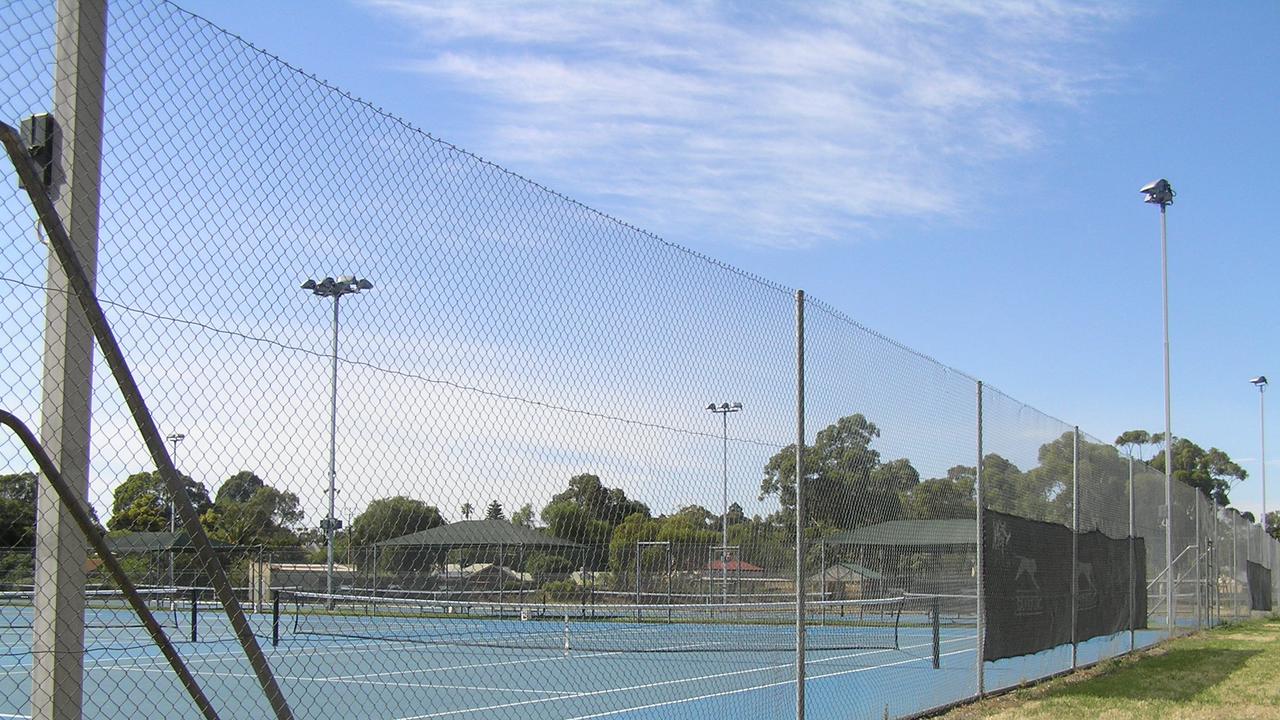Tumby Bay jetty closure leads to death threats and division within the community
A picturesque coastal town in rural SA is now home to a community torn apart. And it’s down to the closure of one thing.
SA News
Don't miss out on the headlines from SA News. Followed categories will be added to My News.
It’s the historic wooden structure that has been a uniting force in the small Eyre Peninsula town of Tumby Bay for more than a century.
But these days, the dilapidated Tumby Bay Jetty is a sad shell of its former self, and debate about its future is tearing the community apart.
The jetty has been closed for the past two summers and is unlikely to open again anytime soon – deemed unsafe to even walk on after years of neglect.
It’s also the canary in the coalmine for the future of South Australian regional jetties, many of which face an uncertain future after decades of wear and tear and inadequate maintenance funding.
As the Sunday Mail today launches a new series which aims to shine a spotlight on the importance of jetties in SA, we visited Tumby Bay, about 600km from Adelaide, to unpack the impact the closure of the jetty has had on the town’s 3000-or-so residents.
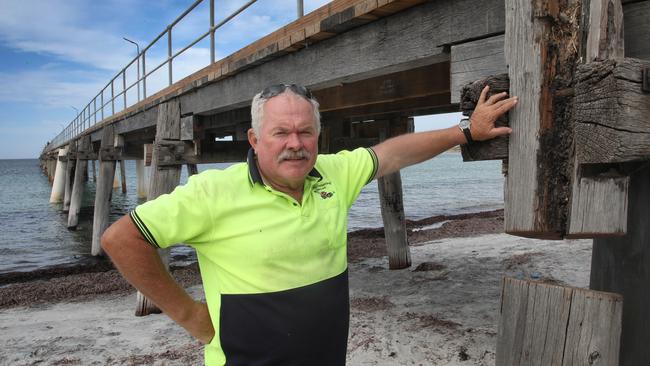
DEATH THREATS
Tumby Bay locals’ worst nightmare became reality after a wild storm in October, 2022 forced the council to close a jetty which had been the centrepiece of community activity for generations.
About a month later, Geoff Churchett assumed the role of mayor, and the retired policeman, who spent most of his 45 years on the force on the Eyre Peninsula, has been dealing with the fallout ever since.
Mr Churchett lives about 20 minutes up the road in Port Neill, on the northern edge of the Tumby Bay District Council. He has also been the subject of death threats from residents frustrated at a perceived lack of action in repairing the jetty.
His cause hasn’t been helped by the fact the council decided to funnel $1.35m into repairing the Port Neill jetty last year, and has committed to spending another $750,000 to finish the refurbishment.
Tumby Bay jetty, meanwhile, remains closed.
“I copped it pretty bad about that,” Mr Churchett, 65, says when we meet on the Port Neill foreshore. “But the amount of damage to the Tumby Bay Jetty was way in excess of what we had to spend so council made a decision at the time to put all of that money into Port Neill jetty.
“Better to have one jetty open and functioning than to have two in our district that are closed.”
Mr Churchett says he doesn’t take the death threats personally. He’s somewhat accustomed to them considering his previous job, but is annoyed when people ring up and abuse or threaten council staff.
“Most of them are just people venting their frustrations but the girls in the office don’t need to take that sort of rubbish,” he says.
“So that is disappointing, but we’ll get around it. The council is strong and my councillors are strong and they want, and I want, what’s best for Tumby Bay, and for Port Neil, and the other little towns of Lipson and Ungurra.”
The council has been lobbying the State Government to help pay to repair the Tumby jetty which, like 35 other jetties around the state, is owned by the state but leased to local government on the condition the council takes charge of maintenance.
But Mr Churchett, like other regional mayors and council CEOs, says it is impossible to foot the maintenance bill by relying on rates alone. Earlier this month his council distributed a survey to his 1300 ratepayers asking if they would be prepared to pay a levy of up to 15 per cent towards repairing the jetty at Tumby Bay.
Only a couple of days after the survey went out, the State Government offered to pay half of a $4.8m bill it estimated is needed to reopen the jetty. Council figures provided in the survey say it will cost about $14m to repair the jetty in full.
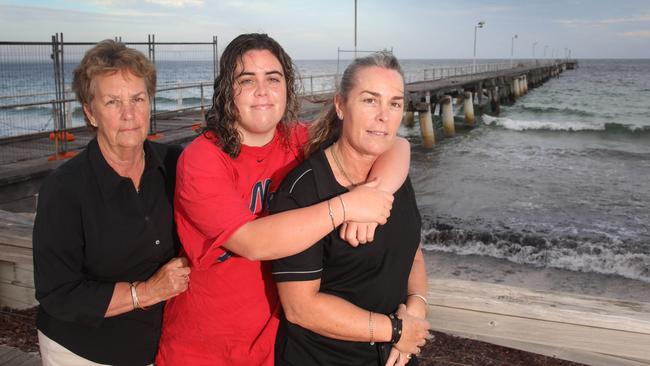
HIT ON TOURISM
Whatever the cost, reopening the jetty can’t come fast enough for publican Charmaine Cross, 47, her daughter Siann, 18, and mother Sally Curtis, 70.
The trio are fourth, fifth and sixth-generation Tumby Bay locals and have a myriad of stories about the jetty, including the time more than 50 years ago when Ms Curtis’s father-in-law Laurie was instrumental in a fight to save the jetty’s outer end.
That was in 1972 when Laurie, then president of the town’s progress association, drove around town in a tractor with a train whistle hooked up to the exhaust to instruct residents to rush to the jetty to stop workers charged with shortening the structure.
As we sit around a table in the Tumby Bay Hotel Ms Cross runs with her husband Joe, the women proudly show newspaper clippings of the protest, including photos of police taking down names of residents who refused to make way for the workers, as an example of the passion locals hold for the jetty.
“Every person who comes into that bar asks a question about the jetty,” Ms Cross says.
“It’s closure has certainly made an impact (to tourism in the town). Slowly but surely it’s starting to really make a difference to who and why people come to Tumby.
“People only stay here for a short period of time. If they can’t go and fish off the jetty, if they can’t send their kids up there to experience catching a squid or a whiting for the first time, they’re not staying as long.”
The trio is also concerned the jetty’s closure means swimmers, divers, kayakers, paddle board operators and anyone else using the bay are denied the safeguard the jetty once offered.
They tell the story of a young relative swimming in the shallows who was blown offshore and was only able to be saved because someone ran to the end of the jetty and dived in to help.
The jetty was also the centrepiece of annual summer VacSwim programs which attracted hundreds of children from across the state. Lessons have moved to a nearby pontoon but Siann, a swimming instructor, says the location is inferior because the gap to the water is virtually non-existent and the water is so shallow children can often stand up.
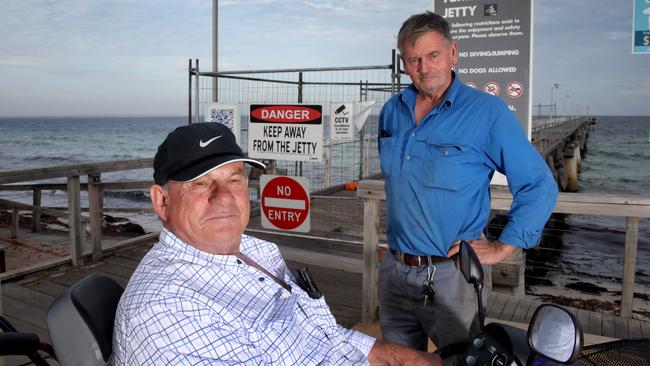
FORCED TO THE PUB
Swimming off the jetty is no longer an option for fellow local Noel Cave, 66, who is restricted to a mobility scooter after he was diagnosed with hydrocephalus five years ago.
His health decline coincided with losing his job and one of his few remaining joys in life had been fishing off the jetty. He spent every day out there, casting a line and talking to tourists and doesn’t mince words when I ask him to describe the effect of the jetty’s closure.
“It’s shit,” he says. “Really depressing – very. It’s absolutely devastating.”
He can’t join family or friends fishing from boats because he can’t stand up, and even if he catches a lift to Port Neill, he has no means of getting out in the jetty because his gopher is back in Tumby.
“I would actually live up on that Tumby jetty now, if it was available,” he says. “And I don’t give a rat’s arse if it collapses when I’m up there, because I’m gunna get chucked off the end anyhow – when I’m dead my ashes are going off the end of the jetty.”
Noel is part of a generation who grew up in Tumby back when the town had two jetties. The current one, opened in 1908, has long been known as the big jetty. The town’s original jetty, opened in 1874 about 200m further north and demolished in 1998, was known as the little jetty.
Local children traditionally started their jetty jumping career off the little jetty and graduated to the big jetty. The next step was to jump even further – from the roof of a toilet block.
It was a rite of passage the current generation of Tumby kids no longer have available.
Noel and his brother Paul, 60, say the council acted too hastily when it shut the big jetty in 2022 and question the council’s refurbishment figures.
“It’s a big thing for our town and it’s the only real thing we had that’s a big attraction,” Paul Cave says. “It was like the big pineapple or the big crayfish … well we had the big jetty.”
I ask Noel what he does with his days now that the jetty is no longer available.
“Go to the pub and drink,” he says, with a resigned shrug of his shoulders.
He knows that’s a negative result for both his physical or mental health, but his options are limited.
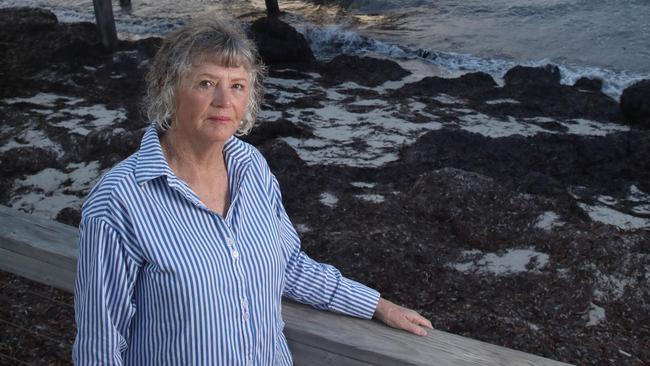
PLEASE HELP US
The mental health and wellbeing of her community is also top of mind when another long-time local Julie Elliott speaks about the jetty’s closure.
Ms Elliott, 68, moved to Tumby with her late husband when she was 20 and fell in love with the town, its people, and its jetty.
“Our distances are vast so we need all the facilities that we can,” she says. “We don’t have all the things that happen in the city. We appreciate health and fitness and we need to cater for everybody, including those in wheelchairs.
“The jetty is one of the few things we have available.”
Ms Elliott meets us at dawn to share a sun rise, and urges the state government to step up to help all coastal communities.
“Please, please listen to these communities that are hurting,” she said. “Please support us. Support the communities in their endeavour to maintain these jetties. We can’t do it alone.”
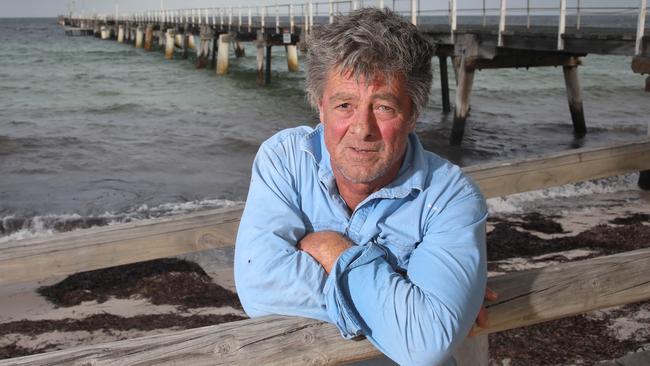
TOWN TORN APART
Tumby Bay Progress Association president and local farmer Dion LeBrun, 62, is concerned the jetty’s closure will also have a negative outcome for local youths, who have lost a place to congregate and learn from older generations.
“We’ve been lucky,” he says. “As a remote, regional town we should have all sorts of bad social issues but we don’t, because everyone has known each other and looks out for each other.
“As a Tumby kid, you lived at the jetty, you grew up there. It was where you hung out, learned to swim and mixed with your friends.
“Importantly, you got to mix with all the older kids – and the younger kids. You were a Tumby kid and everyone got to look out for each other up the jetty.
“And I think that’s what’s probably helped make the town such a cohesive, friendly place. It really helped make the social fabric of the town.”
Mr LeBrun says debate about the future of the jetty has “torn the town apart” as locals come to terms with the uncertainty of its future. He says many are too quick to blame and abuse council staff and elected members, when the current situation is the result of decades of neglect.
“It’s been a problem that’s been sitting there for 50 years,” he says. “Successive governments have recognised the enormity of the problem and said ‘shit, this is too hard to deal with, we’ll just ignore it and sweep it under the carpet’.
“There’s been no long-term planning done as to what’s going to happen with D-Day comes, and D-Day is here now.”
He points out that many regional jetties, iconic images of coastal South Australia, are “falling to bits” after existing in hostile environments for more than a century.
“I’m a bit frightened as to what’s going to happen in the future, not just to our town, but to all towns who have jetties and could lose them,” he says.
More Coverage
Originally published as Tumby Bay jetty closure leads to death threats and division within the community





